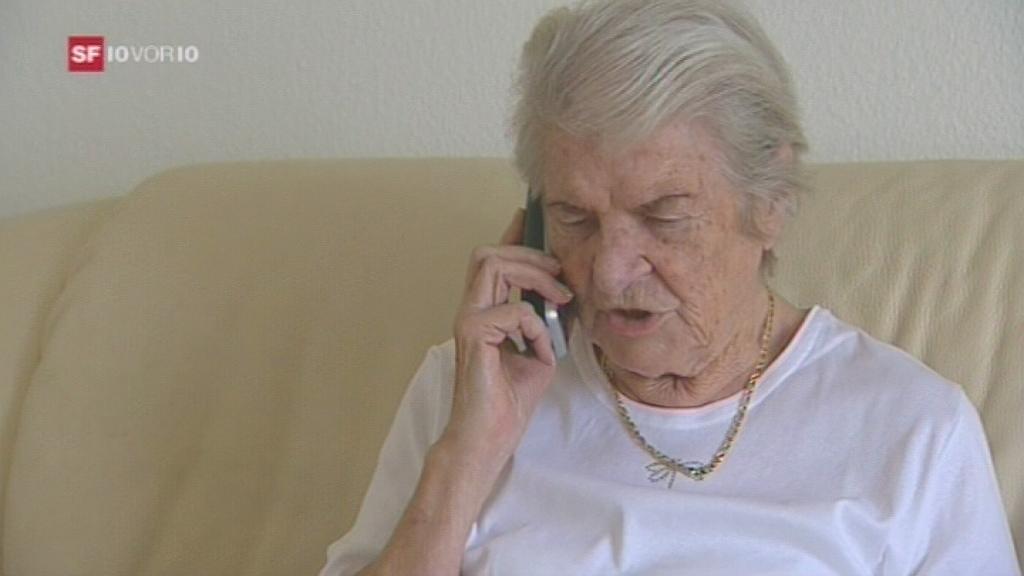Unscrupulous tricksters target the elderly

Swiss police are sounding the alarm over a telephone scam in which old people are tricked into handing over big sums of money by false acquaintances.
According to the latest figures, the so-called “grandchild trick”, carried out by foreign gangs, has netted more than SFr5 million ($4.72 million) in Switzerland over the past year.
“We had around 600 registered attempts in the last year and 100 cases of loss. The sum involved is around SFr5.5 million, which is around SFr55,000 per fraud,” Rudolf Mäder, head of the fraud and white-collar crime department at Bern cantonal police, told swissinfo.ch.
The real damage could be a lot larger, as many cases go unreported, added Mäder, who also leads the national coordination office that gathers information on the scam. The con has been on the rise over the past two years.
A typical scenario, he said, involves a caller telephoning a Swiss victim at home with a Polish prepaid mobile phone, which have unregistered SIM cards.
Having ascertained that the victim knows somebody in Germany, the caller pretends to be that person.
Old-fashioned names
“Old people are targeted and are chosen via an electronic telephone book. They look for old fashioned first names such as Gertrud, Elsa and Berta,” Mäder said.
The caller says that he is buying a house in Switzerland and needs a sum of money straightaway as he is already at the notary. He says that he will pay the money back. The trusting victim then goes to the bank to withdraw the funds.
Meanwhile, a group of “collectors” in Switzerland are sent to watch the victim’s movements. After returning, the caller telephones to say he can’t come and will send someone else to collect the funds.
The victim hands over the money. “There is no further call. Then people start to think about the whole thing and perhaps call Germany, but it’s mostly too late,” Mäder said.
In a recent case, a pensioner in Zug lost SFr145,000 despite being warned by the bank.
International gang
Police know that the highly organised international gang is made up of clans of travellers of German-Polish background. The tricksters also target Germany and Austria.
The coordination office, set up around a year ago for the cantonal police forces, has links to enquiries abroad. As it’s Poland’s responsibility to go after the gang, the Swiss are left to find the collectors. This is no easy task – the slightest disturbance and the fraudsters break contact.
Banks and financial institutions are only able to take limited action.
“Every person of age should basically have their money at their disposal whenever they wish,” Alex Josty of the Swiss Post’s PostFinance told swissinfo.ch by email.
“Post employees do ask clients about their reasons when an unusual or high sum of money is taken out. In this way they can make the client aware of a possible fraud.”
Value system
The gang calls hundreds of people a day. Nicole Rach, a psychologist for the elderly at the gerontopsychiatric day clinics in Olten and Solothurn, says there are several reasons why some old people are vulnerable.
“One is the social value system of the older generation which can, for example, involve a big willingness to sacrifice yourself for others, or a sense of duty, or always being polite and not ever disappointing others,” Rach, also a Swiss Gerontopsychology Society board member, told swissinfo.ch.
Another issue is low self confidence, of the old not wanting to say they can’t remember a person or believing society’s view that the elderly have memory problems, she added. Loneliness is also a risk factor.
In people with dementia, which may be undiagnosed in its early stages, the power of judgement is impaired, Rach said. This differs to healthy older people, who on average may need more time for complex information processing, but still have their powers of judgement.
Prevention
Rach says that the con should be discussed in families. “If the feeling is that an elderly father is vulnerable he could agree to call before he gives money away,” she said.
Dementia suspicions should be checked out, and a good social network can help the old feel less lonely and add a sense of purpose, she added. Social competence training, such as in saying “no”, can also help.
Mäder advises people not to talk about money on the phone and not to hand over cash as bank transfers are much safer. Above all, if in doubt, stop the call.
“SFr5.5 million has been obtained dishonestly in one year, this is a high sum and it’s money being taken from old people who might need it later. That’s the problem, it’s their savings,” said Mäder.
Isobel Leybold-Johnson, swissinfo.ch
A couple in Oberwangen near the Swiss capital Bern were tricked out of SFr80,000 by someone claiming to be an acquaintance who said that the money was needed for a flat. A “secretary” came to collect the money and then disappeared.
An 84-year-old pensioner in Zurich was talked into handing over SFr100,000 for a property sale to a man claiming to be German acquaintance, “Jürgen”. Soon after the pensioner took out the money, a woman claiming to be an employee of the property firm turned up at his home to collect it.
In Zug a 71-year-old man handed over SFr145,000 to tricksters despite being warned against it by a bank employee.
Not all attempts are successful. After being asked for €80,000 (SFr121,300) by “Jochen”, a 60-year-old Zug woman asked for time to think it over. Impatient, “Jochen” called a dozen times in the next three hours and became aggressive. The woman alerted the police. It was decided to make an appointment with “Jochen”, but he never turned up.
The gang mostly targets German-speaking Switzerland, but there have been a few reports of activity in the French- and Italian-speaking parts of Switzerland as well.

In compliance with the JTI standards
More: SWI swissinfo.ch certified by the Journalism Trust Initiative




You can find an overview of ongoing debates with our journalists here. Please join us!
If you want to start a conversation about a topic raised in this article or want to report factual errors, email us at english@swissinfo.ch.